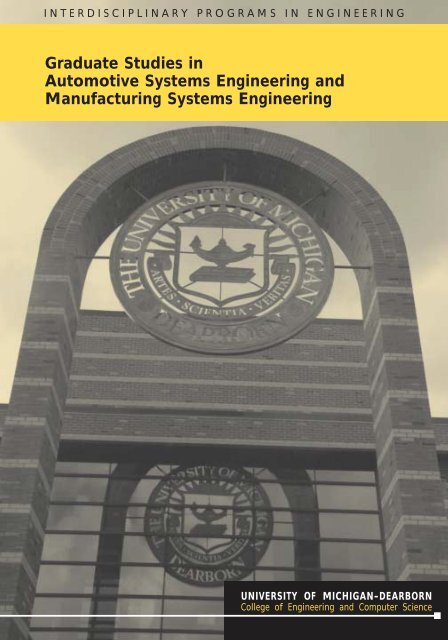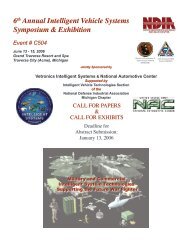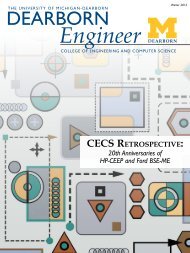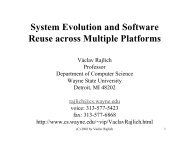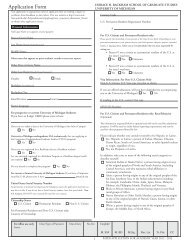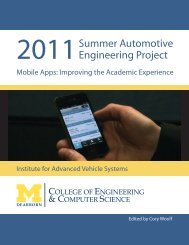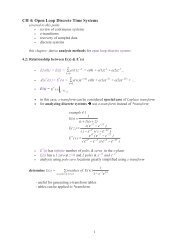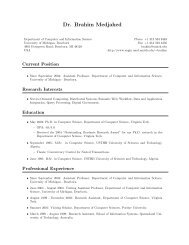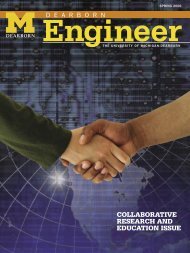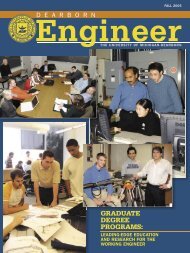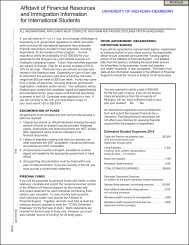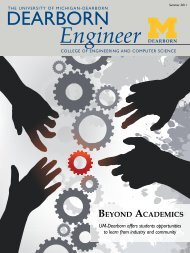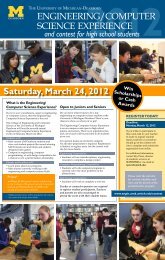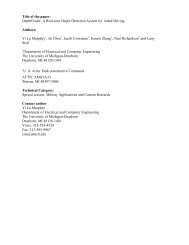UMD Interdisiplinatry programs - University of Michigan - Dearborn ...
UMD Interdisiplinatry programs - University of Michigan - Dearborn ...
UMD Interdisiplinatry programs - University of Michigan - Dearborn ...
Create successful ePaper yourself
Turn your PDF publications into a flip-book with our unique Google optimized e-Paper software.
INTERDISCIPLINARY PROGRAMS IN ENGINEERING<br />
Graduate Studies in<br />
Automotive Systems Engineering and<br />
Manufacturing Systems Engineering<br />
UNIVERSITY OF MICHIGAN-DEARBORN<br />
College <strong>of</strong> Engineering and Computer Science
UNIVERSITY OF MICHIGAN-DEARBORN<br />
College <strong>of</strong> Engineering and Computer Science<br />
The mission <strong>of</strong> the College <strong>of</strong> Engineering and Computer<br />
Science at the <strong>University</strong> <strong>of</strong> <strong>Michigan</strong>-<strong>Dearborn</strong> is to be a<br />
leader in providing quality undergraduate and graduate<br />
<strong>programs</strong> in an environment integrated with engineering<br />
practice, research and continuing pr<strong>of</strong>essional education,<br />
in close partnership with the industrial community.<br />
The College <strong>of</strong> Engineering and Computer Science <strong>of</strong>fers<br />
nine accredited undergraduate <strong>programs</strong> and twelve graduate<br />
<strong>programs</strong>. Graduate classes are <strong>of</strong>fered in the evenings, making<br />
them convenient for many graduate students who work<br />
in local industry. In 2000-01 the enrollment in the college<br />
included more than 1,500 undergraduate students and nearly<br />
900 graduate students. The college’s graduate school is one<br />
<strong>of</strong> the fastest growing <strong>programs</strong> in the university.<br />
The college’s partnerships with major domestic automobile<br />
companies and automotive suppliers have led to many<br />
educational opportunities for its students and research for<br />
both students and faculty. Regular feedback from its Visiting<br />
Committee, comprised <strong>of</strong> industrial leaders, helps shape<br />
the curricula, develop laboratory facilities and design<br />
collaborative research projects in the college.<br />
One <strong>of</strong> the outcomes <strong>of</strong> the industry partnership was the<br />
establishment <strong>of</strong> the Center for Engineering Education and<br />
Practice in 1994. The Center helps to incorporate engineering<br />
practice, design, innovation and concepts <strong>of</strong> manufacturing<br />
technology at all levels <strong>of</strong> engineering education by integrating<br />
the teaching environment with the world <strong>of</strong> practice.
Interdisciplinary<br />
Programs<br />
The College <strong>of</strong> Engineering and Computer Science <strong>of</strong>fers two<br />
interdisciplinary graduate studies <strong>programs</strong>; Automotive Systems<br />
Engineering and Manufacturing Systems Engineering. Both <strong>programs</strong><br />
are designed to provide breadth across traditional engineering<br />
disciplines and depth in several alternative areas <strong>of</strong> specialization and<br />
build on students’ undergraduate education in mechanical engineering,<br />
electrical engineering or industrial engineering. Instead <strong>of</strong> continuing<br />
with in-depth studies in one <strong>of</strong> these disciplines, the <strong>programs</strong> provide<br />
practice-oriented courses that, in many cases, combine fundamental<br />
principles learned in these disciplines with application examples on<br />
automotive design, manufacturing and technology. They <strong>of</strong>fer a broad<br />
range <strong>of</strong> core courses that not only prepare students for more advanced<br />
elective courses, but also give them a wide background in each field.<br />
The most important attribute <strong>of</strong> these two <strong>programs</strong> is their “systems”<br />
approach to understanding and solving engineering problems that<br />
arise in the automotive industry or the manufacturing industry.<br />
Courses in the Interdisciplinary Programs are taught by faculty from<br />
the Departments <strong>of</strong> Mechanical Engineering, Electrical and Computer<br />
Engineering, and Industrial and Manufacturing Systems Engineering.<br />
Most <strong>of</strong> the faculty maintain regular and close interaction with the<br />
automotive and manufacturing industries through research, consulting<br />
and internships. Full-time faculty are <strong>of</strong>ten augmented by adjunct faculty<br />
from local companies, who bring a wealth <strong>of</strong> practical experience<br />
with them into the classroom.<br />
The Interdisciplinary Programs were established through extensive<br />
consultation with industry engineers and executives. Many new courses<br />
have been developed and are continually being developed to bring<br />
cutting-edge technology and information to students. As with other<br />
graduate <strong>programs</strong> in the <strong>University</strong>, they are reviewed periodically to<br />
keep them relevant, up-to-date and useful.<br />
Evening courses, careful scheduling, innovative teaching and learning<br />
methods, and a selective admissions policy enable students to complete<br />
these highly demanding <strong>programs</strong> while providing the opportunity to<br />
maintain their careers and homelives. Full time students can complete<br />
the program in twelve or sixteen months; others can pace their studies<br />
over two, three, or even four years depending on their own needs.
Automotive Systems Engineering<br />
The automotive industry <strong>of</strong> the twenty-first century is poised to<br />
advance at a rapid pace with greater emphasis on lightweight<br />
structures, high efficiency powertrains, intelligent control systems,<br />
lower emissions, robust design and manufacturing as well as improved<br />
comfort and safety. To meet the challenges <strong>of</strong> the automotive industry,<br />
engineers will be required to improve their technical knowledge<br />
and skills on a variety <strong>of</strong> topics that are beyond the realm <strong>of</strong><br />
traditional engineering curricula.<br />
Automotive engineers are expected to make connections among different<br />
areas <strong>of</strong> knowledge and integrate them in ways that benefit the automotive<br />
industry, society and the environment. They must be well-grounded<br />
in their own areas <strong>of</strong> specialty, have a good understanding <strong>of</strong> the related<br />
disciplines, be skilled in synthesis, analysis and design, work effectively<br />
in a team environment and adopt a “systems” approach.<br />
In response to these needs, the College <strong>of</strong> Engineering and Computer<br />
Science has designed a 30-credit hour interdisciplinary graduate<br />
degree program leading to a master’s degree in automotive systems<br />
engineering. This program is <strong>of</strong>fered through the Rackham School<br />
<strong>of</strong> Graduate Studies at the <strong>University</strong> <strong>of</strong> <strong>Michigan</strong>.<br />
Many courses in this program are specifically designed to address the<br />
new and emerging technologies in the automotive industry. Students in<br />
the program learn about the advanced technologies and study ways to<br />
apply them in practice for creative design and problem solving.<br />
The program provides:<br />
■ Depth in the area <strong>of</strong> automotive engineering<br />
■ Breadth across engineering disciplines <strong>of</strong> electrical, industrial,<br />
mechanical, manufacturing and materials engineering<br />
■ Industrially relevant engineering design or research experience<br />
through a capstone group project or a master’s thesis
COURSES<br />
Automotive Systems Engineering<br />
Area I – 4 courses (12 credit hours)<br />
Core Area<br />
AE 500*<br />
AE 502<br />
AE 505<br />
AE 510<br />
AE 541<br />
AE 545<br />
AE 547<br />
AE 581<br />
AE 583<br />
AE 587*<br />
AE 596<br />
* Required courses<br />
The Automobile - An Integrated System<br />
Modeling <strong>of</strong> Automotive Systems<br />
Digital Systems and Microprocessors<br />
Vehicle Electronics I<br />
Introduction to Automotive Dynamics<br />
Vehicle Ergonomics I<br />
Automotive Powertrains I<br />
Materials Selection in Automotive Design<br />
Project Management and<br />
Concurrent Engineering<br />
Automotive Manufacturing Processes<br />
Internal Combustion Engines I<br />
Area II – 4 courses (12 credit hours)<br />
Concentration Area<br />
INDUSTRIAL AND MANUFACTURING<br />
CONCENTRATION<br />
IMSE 513<br />
IMSE 538<br />
IMSE 561<br />
IMSE 569<br />
IMSE 593<br />
AE 546<br />
Robust Design<br />
Intelligent Manufacturing Systems<br />
Total Quality Management<br />
System Simulation in Automotive<br />
Engineering<br />
Vehicle Package Engineering<br />
Vehicle Ergonomics II<br />
ELECTRICAL AND COMPUTER CONCENTRATION<br />
ECE 515 Vehicle Electronics II<br />
ECE 531 Intelligent Vehicle Systems<br />
ECE 532 Automotive Sensors and Actuators<br />
ECE 533 Active Automotive Safety Systems<br />
ECE 536 All Weather Automotive Vision<br />
ECE 546 Electric Vehicles<br />
ECE 565 Digital Control Systems<br />
MECHANICAL ENGINEERING CONCENTRATION<br />
ME 537<br />
ME 543<br />
ME 545<br />
ME 548<br />
ME 583<br />
ME 597<br />
ME 598<br />
AE 550<br />
AE 565<br />
AE 598<br />
Automotive Air Conditioning Systems<br />
Vehicle Dynamics<br />
Acoustics and Noise Control Systems<br />
Automotive Powertrains II<br />
Mechanical Behavior <strong>of</strong> Materials<br />
Internal Combustion Engines II<br />
Automotive Emissions<br />
Design <strong>of</strong> Automotive Chassis<br />
and Body Systems<br />
Vehicle Acoustic Interior System Design<br />
Energy Systems for Automotive Vehicles<br />
AUTOMOTIVE MATERIALS CONCENTRATION<br />
AE 584<br />
AE 585<br />
AE 586<br />
ME 582<br />
ME 584<br />
ME 587<br />
Lightweight Automotive Alloys<br />
Ceramics for Automotive Applications<br />
Design and Manufacturing with<br />
Automotive Materials<br />
Injection Molding<br />
Mechanical Behavior <strong>of</strong> Polymers<br />
Automotive Composites<br />
Area III – (6 credit hours)<br />
Capstone Project/Thesis<br />
Capstone projects are designed to be team-oriented<br />
to further emphasize the interdisciplinary nature <strong>of</strong> the<br />
program. A thesis is work by an individual student. A<br />
capstone project or thesis is conducted over a period<br />
<strong>of</strong> two semesters, usually the last two semesters.<br />
AE 698<br />
AE 699<br />
Capstone Project<br />
Master’s Thesis
Manufacturing Systems Engineering<br />
Manufacturing Systems Engineering at the <strong>University</strong> <strong>of</strong><br />
<strong>Michigan</strong>-<strong>Dearborn</strong> is a 36-credit hour interdisciplinary master’s<br />
degree program <strong>of</strong>fered through the Rackham School <strong>of</strong> Graduate<br />
Studies at the <strong>University</strong> <strong>of</strong> <strong>Michigan</strong>. Its curriculum has been<br />
designed to educate manufacturing pr<strong>of</strong>essionals who will be designing,<br />
building, and managing the competitive production systems <strong>of</strong><br />
the 21st century. The curriculum consists <strong>of</strong> courses specifically<br />
designed for the program by engineering and management faculties.<br />
A significant management science component is an integral part <strong>of</strong><br />
the program. Students and faculty have access to production systems<br />
in one <strong>of</strong> the world's major manufacturing complexes. Guest lectures<br />
by experts from industry, plant tours, and a wealth <strong>of</strong> experience<br />
in the student body and faculty constitute major assets <strong>of</strong> the<br />
program. Some <strong>of</strong> the highlights <strong>of</strong> the manufacturing systems<br />
engineering curriculum include:<br />
■ Maintains a balance between manufacturing, design, management<br />
and human aspects through core courses<br />
■ Adds depth through concentration electives<br />
■ Provides flexibility in course selection<br />
■ Allows students the option <strong>of</strong> electing courses in the areas <strong>of</strong> their<br />
interest, including up to five courses in the School <strong>of</strong> Management<br />
The curriculum emphasizes fundamental methodologies used in the<br />
manufacturing field. It also provides the design and analysis tools that<br />
today’s manufacturing engineers need to be successful in their work.<br />
To accomplish these objectives, the curriculum is divided into core<br />
courses that give fundamentals and concentration courses that give<br />
depth. Examples <strong>of</strong> core courses include manufacturing systems,<br />
manufacturing processes, human performance engineering, total<br />
quality management, design for assembly and manufacture, and<br />
manufacturing cost estimation. For depth, a student has the option<br />
<strong>of</strong> specializing in one <strong>of</strong> the following three areas <strong>of</strong> concentration:<br />
■ Manufacturing Systems with courses such as Computer<br />
Based Automation, Intelligent Manufacturing Systems, and<br />
Production Planning<br />
■ Manufacturing Processes with courses such as Injection<br />
Molding, Metal Forming, and Rapid Prototyping<br />
■ Manufacturing Management with courses such as Global<br />
Operations Management, Supply Chain Management, and<br />
Human Resource Management
COURSES<br />
Manufacturing Systems Engineering<br />
Area I – 6 courses (18 credit hours)<br />
Core Area<br />
IMSE 533<br />
ME 588<br />
or<br />
ECE 539<br />
IMSE 534<br />
IMSE 561<br />
IMSE 583<br />
IMSE 521<br />
or<br />
BE 656<br />
Manufacturing Systems<br />
Materials and Manufacturing<br />
<strong>of</strong> Mechanical Products<br />
Materials and Manufacturing<br />
<strong>of</strong> Electrical Products<br />
Human Performance Engineering<br />
in Manufacturing<br />
Total Quality Management<br />
Design for Assembly and Manufacture<br />
Manufacturing Cost<br />
Estimation and Control<br />
Engineering Economics for<br />
Manufacturing and Cost Control<br />
Area II – 4 courses (12 credit hours)<br />
Concentration Area<br />
MANUFACTURING SYSTEMS CONCENTRATION<br />
IMSE 483 Computer Integrated Manufacturing<br />
IMSE 538 Intelligent Manufacturing Systems<br />
IMSE 580 Production Management<br />
IMSE 581 Production Planning and Scheduling<br />
ECE 569 Computer Based Automation<br />
ECE 588 Applied Machine Vision<br />
MANUFACTURING PROCESSES<br />
CONCENTRATION<br />
IMSE 488 Metal Forming Processes<br />
IMSE 537 Metal Removal Processes<br />
IMSE 589 Product Design and Rapid Prototyping<br />
ME 582 Injection Molding<br />
ME 585 Cast Metals in Engineering Design<br />
ME 586 Materials Considerations in<br />
Manufacturing<br />
ME 587 Automotive Composites<br />
ECE 516 Electronic Materials and IC Processes<br />
MANUFACTURING MANAGEMENT<br />
CONCENTRATION<br />
EM 541<br />
IMSE 580<br />
OM 571<br />
IMSE 565<br />
OB 510<br />
HRM 561<br />
IMSE 588<br />
Financial and Managerial Accounting<br />
Production Management<br />
Global Operations Management<br />
Supply Chain Management<br />
Organization Behavior<br />
Human Resource Management<br />
Building Highly Performing<br />
Learning Organizations<br />
Area III – 2 courses (6 credit hours)<br />
Free Electives<br />
Following are some suggested free electives:<br />
IMSE 511 Design <strong>of</strong> Experiments<br />
COMM 570 Advanced Technical and<br />
Pr<strong>of</strong>essional Communication<br />
CIS 515 Computer Graphics<br />
CIS 551 Advanced Computer Graphics<br />
ECE 552 Fuzzy Systems<br />
ECE 580 Digital Signal Processing<br />
ECE 585 Pattern Recognition<br />
ME 580 Advanced Engineering Materials<br />
ME 583 Mechanical Behavior <strong>of</strong> Materials<br />
ME 584 Mechanical Behavior <strong>of</strong> Polymers<br />
ME 589 Composite Materials<br />
A thesis may be substituted for six hours <strong>of</strong><br />
electives on approval from the program director.<br />
The thesis work may be an actual industrial<br />
assignment if it meets certain requirements.
Center for<br />
Lightweighting<br />
Automotive<br />
Materials and<br />
Processing<br />
A leading university research center<br />
The Center for Lightweighting Automotive Materials and Processing<br />
(CLAMP) is the nation’s only university research center dedicated to<br />
exploring the design potential, applications and manufacturing <strong>of</strong><br />
advanced materials for lightweight automobiles.<br />
CLAMP was created in 1998 with a grant from the U.S. Department <strong>of</strong><br />
Energy’s Graduate Automotive Technology Education (GATE) Program.<br />
Recognizing the gains in fuel economy and emission levels achieved<br />
through lighter cars, the GATE program encourages research into<br />
automotive design and manufacturing methods that reduce vehicle<br />
mass. Nine universities were awarded the prestigious grants in five<br />
advanced automotive technology areas. UM-<strong>Dearborn</strong> was the only<br />
university that received a grant in the lightweight materials field.<br />
Educating future engineers<br />
Still in the early stages, lightweight automotive design and manufacturing<br />
are positioned to grow into a major engineering field in the coming years.<br />
Committed to preparing the field’s future leaders, the college <strong>of</strong>fers, in<br />
cooperation with CLAMP, a lightweight materials concentration within<br />
the graduate program in Automotive Systems Engineering. Courses focus<br />
on automotive alloys, ceramics, polymers and composites, and designing<br />
with these materials. CLAMP provides fellowship funding to U.S. students<br />
who elect this concentration.<br />
Research<br />
Research is a key component <strong>of</strong> CLAMP’s efforts. The materials and<br />
processing research at CLAMP is directed toward automotive applications<br />
that will reduce vehicle mass and improve manufacturing productivity.<br />
The focus is on applications, with multiple objectives:<br />
■ Develop a better understanding <strong>of</strong> the design and processing<br />
capabilities <strong>of</strong> advanced automotive materials<br />
■ Formulate design guidelines based on materials-processingproperties<br />
relationships<br />
■ Produce new and improved process technology and models to<br />
reduce process variability and process-related design problems<br />
An information repository<br />
Lightweight automobile manufacturing is an emerging field that requires<br />
faculty and industry pr<strong>of</strong>essionals to stay abreast <strong>of</strong> research and recently<br />
developed materials. One <strong>of</strong> CLAMP’s most important activities is<br />
compiling the latest research so that information is easy to find and<br />
accessible. The Automotive Materials Database is a web-based repository<br />
<strong>of</strong> lightweight materials that puts the latest information at the fingertips<br />
<strong>of</strong> engineers, designers, researchers and students.
Institute for<br />
Advanced<br />
Vehicle Systems<br />
The mission <strong>of</strong> the Institute for Advanced Vehicle Systems (IAVS) is to<br />
accelerate applied research and enhance curriculum in the areas <strong>of</strong> product<br />
development and manufacturing. The work <strong>of</strong> IAVS is focused on body and<br />
chassis, manufacturing techniques, and integration with power plant and<br />
driveline systems. The institute conducts projects using private and industrial<br />
funding that is supplemented by state and federal support. IAVS enhances<br />
curriculum for degree-seeking students, refines pr<strong>of</strong>essional education<br />
courses for engineers, accelerates information and technology transfer from<br />
academia to industry, and improves the competitiveness <strong>of</strong> the region.<br />
The institute <strong>of</strong>fers the opportunity to take a fresh look at the way<br />
automobiles are designed, developed, manufactured, and marketed as<br />
well as the infrastructure used in these processes, including supply base,<br />
prototyping and engineering services, enterprise and financial systems,<br />
and distribution networks. IAVS also <strong>of</strong>fers an environment for all levels<br />
<strong>of</strong> the auto industry to explore the application <strong>of</strong> the latest technological<br />
advances and novel ideas that may lead to meeting project objectives<br />
(e.g., reduced weight, reduced energy consumption, reduced environmental<br />
impact, low volume manufacturing) but in a low-risk environment.<br />
IAVS Goals<br />
■ Conduct research and create new systems that will benefit<br />
undergraduate and graduate students, practicing engineers, industrial<br />
partners, lifelong learners, and universities.<br />
■ Provide facilities where industry conduct projects and develop concepts<br />
in conjunction with faculty in a low-risk environment.<br />
The first driving project <strong>of</strong> IAVS is the development <strong>of</strong> a low mass vehicle<br />
with a very efficient body and chassis design and affordable manufacturing<br />
alternatives. The vehicle will be aerodynamic and low cost while <strong>of</strong>fering<br />
increased powertrain efficiency, advanced styling, and long durability.<br />
The benchmark for this project are the Toyota Echo and Ford Focus, which<br />
weigh less than many cars in the class. The goal is to design, develop, and<br />
build a car that is 30 percent lighter but which can still be produced and<br />
marketed in the same price range.<br />
For this project, IAVS is particularly interested in advancing<br />
technologies associated with:<br />
■ Auto Body Design and<br />
Manufacturing<br />
■ Lightweight Materials<br />
■ Rapid Prototyping<br />
■ Energy Management for Crash<br />
■ Ride, Handling and Stability<br />
■ Aerodynamics<br />
■ NVH<br />
■ System Simulation<br />
■ Low Capital Investment<br />
Manufacturing<br />
■ Modular Construction<br />
■ Supply Chain Management<br />
■ E-Commerce
Laboratories<br />
for Teaching<br />
and Research<br />
The College <strong>of</strong> Engineering and Computer Science maintains an array <strong>of</strong><br />
laboratories engaged in teaching and research. Laboratories in the areas<br />
<strong>of</strong> Automotive Systems Engineering and Manufacturing Systems<br />
Engineering are listed below:<br />
■ Fuels and Emissions Laboratory<br />
■ Vibrations and Acoustics Laboratory<br />
■ Human Performance and Ergonomics Laboratory<br />
■ Occupant Packaging and Driving Simulation Laboratory<br />
■ Vehicle Benchmarking Laboratory<br />
■ Power Electronics and Motor Drives Laboratory<br />
■ Automotive Electromagnetic Compatibility (EMC) Laboratory<br />
■ Machine Vision Laboratory<br />
■ Simulation and Automation Laboratory<br />
■ Computer Integrated Manufacturing Laboratory<br />
■ Computer Aided Manufacturing Laboratory<br />
■ Robotics Laboratory<br />
■ Materials Testing Laboratory<br />
■ Materials Characterization Laboratory<br />
■ Plastics and Composites Processing Laboratory<br />
■ Casting and Spray Forming Laboratory<br />
■ Metal Forming Laboratory<br />
■ Rapid Prototyping Laboratory<br />
■ Metrology Laboratory<br />
■ High Speed Computation Laboratory
Research Areas<br />
Faculty teaching in the Interdisciplinary Programs are involved in a<br />
variety <strong>of</strong> basic and applied research in automotive engineering and<br />
manufacturing engineering. The funding for their research comes from<br />
governmental agencies (such as National Science Foundation, Department<br />
<strong>of</strong> Energy and US Army) and industry (such as General Motors, Ford Motor<br />
Co., TRW). Many graduate students in the Interdisciplinary Programs<br />
participate in research, which includes:<br />
■ Performance <strong>of</strong> Lightweight<br />
Automotive Materials<br />
■ Stamping, Hydr<strong>of</strong>orming,<br />
Tailor-Welded Blanking<br />
■ Automotive Composites<br />
Processing and Design<br />
■ Thermoplastic Matrix Composites<br />
■ Injection Molding<br />
■ Spray Forming and Rapid Tooling<br />
■ Rapid Prototyping<br />
■ Joining <strong>of</strong> Materials<br />
■ Corrosion <strong>of</strong> Lightweight Metals<br />
■ Engine Combustion and<br />
Exhaust Emission<br />
■ Engine Flow Diagnostics<br />
■ Alternative Fuels<br />
■ Performance Analysis <strong>of</strong><br />
Catalytic Converters<br />
■ NVH and Vehicle<br />
Acoustic Packaging<br />
■ Vehicle Dynamics and Controls<br />
■ Automotive Systems Modeling<br />
■ Transmission Systems and<br />
Hybrid Powertrains<br />
■ Drivetrain Gear Design<br />
■ Drivetrain Stability<br />
■ Vehicle Crashworthiness<br />
■ Finite Element Crash Simulation<br />
■ Occupant Accommodation<br />
and Vehicle Packaging<br />
■ Driver Vision, Visibility and<br />
Driver Interface<br />
■ Vehicle Lighting<br />
■ Automotive Power Electronics<br />
■ Sensors for Intelligent<br />
Vehicle Systems<br />
■ Supply Chain Management<br />
and E-Commerce<br />
■ Intelligent Tolerance Design<br />
■ Lean Manufacturing<br />
■ Modular Design and<br />
Manufacturing<br />
■ Robust Design and Product<br />
Performance Evaluation<br />
■ Flexible Robotic Assembly<br />
■ Machine Vision Inspection<br />
■ Quality and Reliability<br />
Improvement
UNIVERSITY OF MICHIGAN-DEARBORN<br />
College <strong>of</strong> Engineering and Computer Science<br />
For more information on the<br />
Interdisciplinary Programs, contact<br />
Interdisciplinary Programs<br />
College <strong>of</strong> Engineering and Computer Science<br />
<strong>University</strong> <strong>of</strong> <strong>Michigan</strong>-<strong>Dearborn</strong><br />
4901 Evergreen Road<br />
<strong>Dearborn</strong>, MI 48128-1491<br />
313-593-5582<br />
www.engin.umd.umich.edu<br />
To request an application form,<br />
send e-mail to idpgrad@umd.umich.edu


